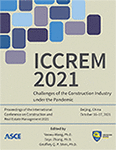Poverty Alleviation Based on the Land Element of Urban–Rural Unified Land Management: The Conflicts and Interactive Games of Limited Property Right House
Publication: ICCREM 2021
ABSTRACT
Limited-ownership housing governance not only solves the problem of housing and land supply, but also improves China’s real estate market. Realizing the coordinated governance of limited-property housing can not only promote the construction of a unified market for urban and rural land, but also stimulate the vitality of rural land, thereby generating a circular effect of land financing. This will not only change the government’s land finance model, but also inject new impetus into China’s economic development, realizing the market-oriented allocation of factors and poverty alleviation. The new “Land Management Law” formally establishes a unified urban and rural land management model, and provides a practical and feasible way for limited property housing issues to enter the market. The comprehensive analysis found that there are serious conflicts of interest among the various equity entities. This not only manifests itself as a conflict between the interest needs and the implementation methods, but also shows that the degree of realization of the interests of different classification rights and interests is misplaced, that is, local governments are unreasonable. On this basis, through further analysis of the game process between local government and rural collective economic organizations, it is found that whether in the case of complete information or incomplete information, the local government prohibits the development of limited property houses, and excessively occupies their interests. All of these will intensify the conflicts in the management of limited property houses, whereas local governments allow rural collective economic organizations to develop limited property houses so that they can share interests in appropriate proportions, and they can achieve game equilibrium among conflicting entities.
Get full access to this article
View all available purchase options and get full access to this chapter.
REFERENCES
Dong, F., and Zheng, X. F. (2017). “The reality and policy requirements of the limited property house departure from discussed opinions based on the framework of Institutional Analysis and Development (IAD).” Academia, (10), 118–130. (in Chinese).
Li, Y. D. (2013). “Limited property housing problem and the preliminary exploration of the issue of land system: based on the perspective of social evolution.” Social Sciences of Beijing, (1), 56–61. (in Chinese).
Li, C. J., Jiang, S. Y., and Chen, Z. K. (2008). “Game issues in limited property rights houses based on the perspective of interest research.” Journal of North China Electric Power University (Social Science Edition), (5), 50–56.(in Chinese).
Liu, M. (2009). “Analyze the reasons and solutions for the emergence of limited property right houses from the perspective of game.” Business and Economics, (2), 37–38. (in Chinese).
Liu, Y., Tian, L. L., and Ma, Y. C. (2011). “Reflections on the governance of limited property right houses from the perspective of interest game.” Journal of Dalian University of Technology (Social Science Edition), 32(04), 107–111. (in Chinese).
Tan, S. K. (2008). “Research on several basic issues of limited property rights housing.” China Real Estate Finance, (12), 12–15. (in Chinese).
Wang, H. L. (2009). “Interest attribution theory of limited property houses and collective land.” Tsinghua Law Science, 3(5), 35–42. (in Chinese).
Xu, H. Y., Mei, Y., and Zhang, H. J. (2008). “Economic thinking of limited property houses from the perspective of interest game.” Reform of Economic System, (5), 140–143. (in Chinese).
Yan, Y. (2008). “ Formation reason and outlet of limited property house.” Special Zone Economy, (2), 213–214. (in Chinese).
Zhang, Y. T. (2001). Theory of interests: research on conflict of interest and coordination issues, Wuhan University Press, Wuhan. (in Chinese).
Zhong, R., He, D. X., Tian, S. S., Zhang, T. F., and Yang, S. M. (2015). “Game analysis of relevant stakeholders of limited property housing from the perspective of interest.” China Real Estate, (23), 74–80. (in Chinese).
Information & Authors
Information
Published In
Copyright
© 2021 American Society of Civil Engineers.
History
Published online: Dec 9, 2021
Authors
Metrics & Citations
Metrics
Citations
Download citation
If you have the appropriate software installed, you can download article citation data to the citation manager of your choice. Simply select your manager software from the list below and click Download.
